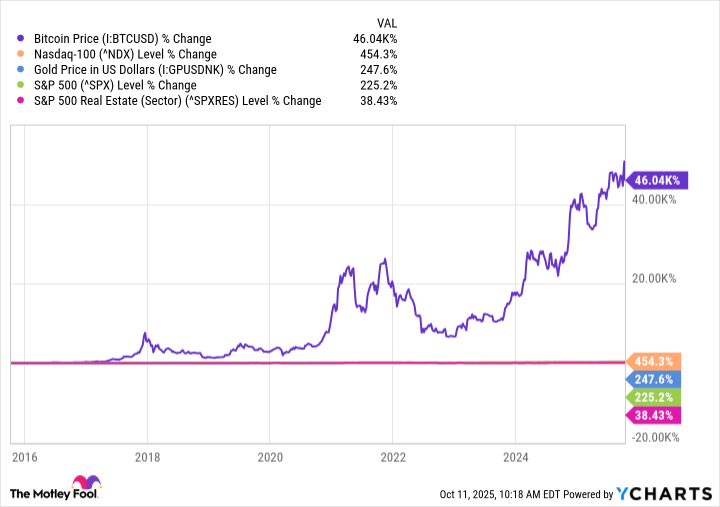Ark Investment Management, which was founded by seasoned technology investor Cathie Wood, is extremely bullish on the cryptocurrency industry. In fact, Ark was one of the first firms to receive approval from the Securities and Exchange Commission (SEC) to launch a Bitcoin (BTC 0.04%) exchange-traded fund (ETF) last year.
Bitcoin has a market capitalization of $2.3 trillion as I write this, making it the world's largest cryptocurrency by a considerable margin. But Ark believes there is still plenty of upside on the table; earlier this year, the firm issued a set of forecasts suggesting it could soar to $2.4 million per coin by 2030, implying a potential upside of 2,000% from its current price of about $115,000. How realistic is that target?

Image source: Getty Images.
Incredible performance compared to other assets
Cryptocurrency was once promoted as an alternative to traditional money, but no coins on the market today have successfully garnered mass adoption among consumers or businesses. Instead, Bitcoin has become very popular in the investment community as a store of value because of its unique features, and it's often likened to a digital version of gold.
Bitcoin is fully decentralized, meaning it can't be controlled by any person, company, or government, and it has a capped supply of 21 million coins so it offers the perception of scarcity. It also runs on a secure and publicly verifiable system of record called the blockchain, and investors tend to love transparency.
Bitcoin's decentralized structure is the reason the SEC approved the launch of ETFs. It doesn't fit the legal definition of a financial security because it isn't issued by a person or company, unlike other cryptocurrencies like XRP, which faced years of regulatory headaches.
Most financial advisors and institutional investors avoided Bitcoin until ETFs came along, because owning it through digital crypto wallets was far too risky -- they are susceptible to hacks that can lead to irrecoverable losses. ETFs offer a safe and regulated way to buy the cryptocurrency, and these funds now collectively manage more than $160 billion in assets.
Demand from the investment community continues to drive Bitcoin to new highs. In fact, it has outperformed every other asset class during the past 10 years with an eye-popping gain of 46,040%:
Bitcoin Price data by YCharts
Three catalysts for potential upside
Ark issued a report in April outlining six catalysts that it argues could drive Bitcoin to $2.4 million by 2030, but it expects three of them, specifically, to account for 92% of the upside.
1. Digital gold
Ark believes investors will choose Bitcoin over gold at an increasing rate because it's a more portable store of value, meaning it can be transferred rapidly and is better suited for the modern economy. As a result, Ark says Bitcoin could eventually capture 60% of the total value of all above-ground gold reserves, which currently stands at $27 trillion. That would add $16 trillion to the cryptocurrency's market cap.
2. Institutional investment
As I highlighted earlier, ETFs have made Bitcoin accessible to a broader group of investors. Ark says institutional investors could be managing as much as $200 trillion in assets by 2030, and the firm predicts they will hold up to 6.5% of those assets in Bitcoin, or $13 trillion.
3. An emerging-market currency
Ark thinks Bitcoin could help citizens in developing countries hedge against high inflation and currency debasement because it's so accessible. Any person with an internet connection can buy the cryptocurrency, whereas other assets like U.S. dollars, gold, and stocks tend to have much higher barriers to entry.

CRYPTO: BTC
Key Data Points
Is $2.4 million per Bitcoin a realistic target?
If we take Bitcoin's total supply of 21 million coins and multiply it by Ark's $2.4 million price target, we get a fully diluted market capitalization of $50.4 trillion. That would make Bitcoin 11 times more valuable than the world's largest company, Nvidia, which is valued at $4.6 trillion as I write this.
In fact, $50.4 trillion is almost as much as the combined value of all 500 companies in the S&P 500 index, which is about $57 trillion.
Personally, I don't think Bitcoin will ever be that valuable. It's quite easy to poke holes in some of Ark's assumptions. For example, Ark's institutional investment catalyst implies $13 trillion will flow into Bitcoin by 2030, mainly through ETFs that have only attracted $160 billion to date. It seems unrealistic to expect inflows to surge by 8,000% during the next five years.
Further, if Bitcoin's market cap rose to $27 trillion to match gold's market cap, it would translate to a price per coin of $1.3 million -- still far lower than Ark's target.
I'm not suggesting Bitcoin is a bad investment, but investors should manage their expectations. Buying it as part of a diversified portfolio of other assets is probably the best strategy, because it will minimize the impact of any potential volatility.
